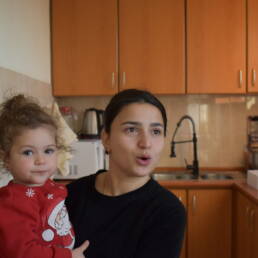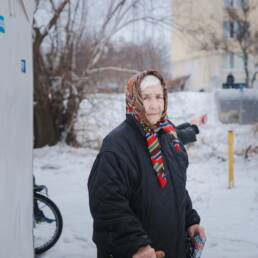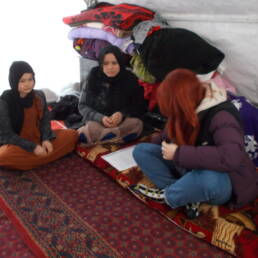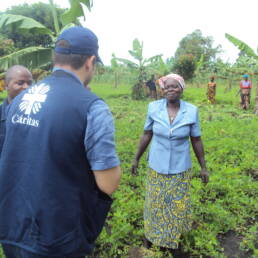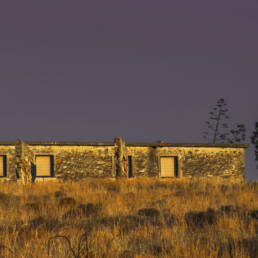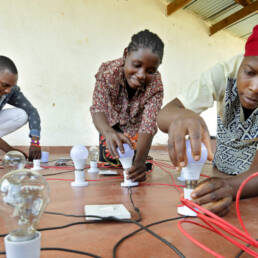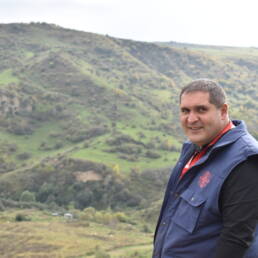Author
Dijana Muzička
Project Manager
Caritas Bosnia and Herzegovina
At any given time, there are tens of thousands of migrants trapped at points along the ‘Balkan route,’ trying to enter the EU on foot, mostly from conflict-ravaged Afghanistan, Syria and Pakistan – but not only.
The most pressing need for these people is to find shelter, not only from the blazing sun of the summer months, but in particular from the cold of brutal Balkan winters. Food, psychosocial support and laundry services are important too, as is the creation of social links with the local population.
In Tuzla, a town in Bosnia and Herzegovina close to the Serbian border, the Government has never opened a camp for migrants and refugees, despite having housed some 10,000 migrants in camps in other similar towns. Still reeling from its own conflict in the 1990s, the country struggles to house its own displaced even today.
In late December 2019 and early January 2020, more than 200 migrants were living at the local bus station, in the cold. Caritas Bosnia and Herzegovina began a laundry service for the migrants at the bus station to help them maintain minimum hygiene standards, while the NGO Merhamet began providing food. Simultaneously, another local NGO, Puž, began to look for a disused building or factory from Soviet times to convert into a safe house for the most vulnerable migrants, asylum seekers and refugees.
In March 2020, the migrants at the bus station were moved to camps in Sarajevo, but more people arrived, seeking safety and better lives.
Funded by Catholic Relief Services (CRS – the internationally operating US national Caritas) and the Latter Days Saint Charities, the four local NGOs – Caritas Bosnia and Herzegovina, Merhamet, Puž and Snaga žene – partnered to provide comprehensive support and tailor-made care for those migrants and refugees who remained and continue to arrive in Tuzla.
Puž now manages two safe houses with the capacity to accommodate 60 persons, where migrants can sleep, shower, wash their clothes, eat and access psychosocial support. Priority is given to women, families with children and vulnerable refugees and migrants with special health needs (such as disabilities, injuries, etc.). Merhamet distributes food for the people in these safe houses and Caritas provides them with laundry facilities (washing machines, soap).
N., 25, was wounded when he arrived at the safe house. He had taken a few beatings along his journey, and he could not really move well and was in pain. His full recovery took three months and was challenging, not only for his physical recovery, but also psychologically. When Usaema started walking again, the safe house staff organised a field trip for him. Afterwards, he said, ‘this place is full of faith and hope for a better future. In Tuzla, thanks to people from different organisations and the support I received, I was re-born’.
The Caritas laundry service is also available for those migrants and refugees who visit the Emmaus centre, where people who are not boarders can take a shower.
In addition, Caritas has opened a drop-in centre for migrants and young people in Tuzla. The centre runs educational activities, helps with the integration of asylum seekers and hosts events that bring migrants and the local population together. Migrants can also leave their laundry to be washed and dried there.

At the centre, migrants and refugees can just drop in. On International Women’s Day, for example, they participated in a creative workshop and made roses out of red paper, which they distributed to volunteers and women on the street. The goal of this activity was to show the local population a better side of the migrants and refugees in Bosnia and Herzegovina than is normally portrayed.
In all these structures (the safe houses and different centres), a psychologist from Snaga žene provides the migrants with psychosocial support, both in group and individual sessions.
S., a young Pakistani, left his country when he was only 12. He celebrated his 18th birthday in Tuzla. In the safe house, he attends individual therapy sessions. As part of these sessions, he drew his dreams and hopes, and because his drawings were very colourful, the safe house organised an exhibition of his work. It took place in the house yard on World Refugee Day. S. still lives in the safe house and applied for asylum in Bosnia and Herzegovina. His dreams are very similar to those of many children in Bosnia and Herzegovina: to learn the language, to go to school and to study. He also hopes to find a job.
In addition, Caritas is responsible for distributing non-food items, such as blankets, cooking pots and utensils, while M. provides food parcels to support new arrivals in the region.
Check out the emergency page for more information about the work of Caritas Bosnia and Herzegovina with migrants and refugees.




